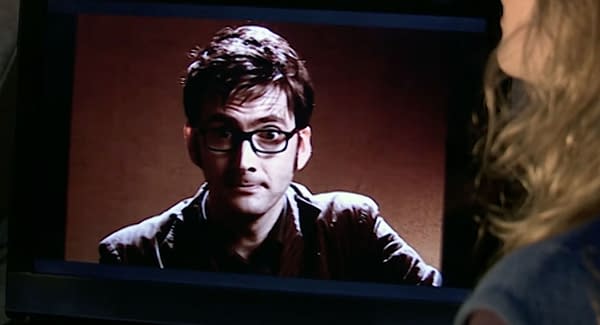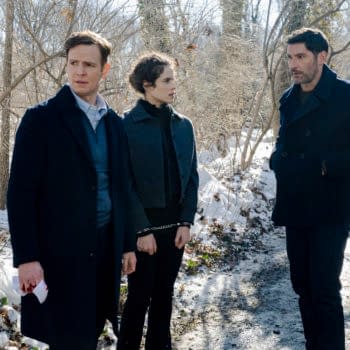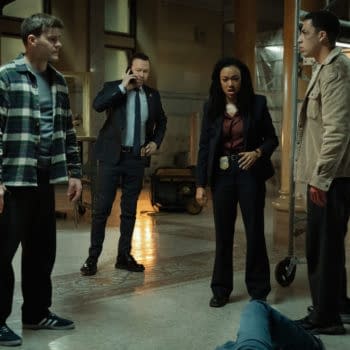Posted in: BBC, Doctor Who, TV | Tagged: bbc, billie piper, david tennant, doctor who, jodie whittaker, matt smith, peter capaldi, russell t davies, steven moffat
Doctor Who Timey-Wimey Stories Work Best When They're Kept Simple
In Doctor Who, timey-wimey stories work best when they're simple, and they get really bad when they're overly complicated with no heart.
There's a new Doctor Who compilation video this week; this time, it's about the series' most notable timey wimey plots, the best and the worst, and there are valuable lessons in storytelling here. In fact, it's given us a chance to make the case that the best of these storylines work because they keep things simple.

When you have a show like Doctor Who that's entirely based on time travel, it follows that sooner or later, the writers will start getting creative with playing with the idea. The basic premise of Doctor Who is deceptively simple: The Doctor and their companions land someplace in the past or future and get involved in an adventure. It offers infinite possibilities and variations on that format. The simplest is they stay in that time and solve the problem in its present, then leave. It's a story generator fit for a series to go on forever, only as good or bad as the writing. Russell T. Davies probably understands that best of all. Steven Moffat understood that but started to introduce complexity and complication in it. Arguably, Moffat is "The Master of Timey Wimey" plotting. Chris Chibnall… is not.
Good Timey Wimey on Doctor Who
Davies' first timey wimey story was in "Father's Day" where the Ninth Doctor (Christopher Eccleston) takes Rose (Billie Piper) back in time to meet her father, who died when she was just a baby, only to create a paradox when she saves him and endangers the entire time-space continuum since he Pete Tyler (Shaun Dingwall) wasn't supposed to live. It takes a father sacrificing himself for the daughter he otherwise wouldn't have known to restore everything. It's a typical example of Davies' blend of emotions driving the plot from start to finish.
Moffat's "Blink" is probably the best timey wimey plot in the entire history of Doctor Who. It also introduced the term "timey wimey" to the English language, has transcended the show, and is even used in other time travel shows now. At its heart is the simple premise of people from two time periods communicating to beat a common menace, and Moffat introduced one of the most elegant Science Fiction monsters of all time, the Weeping Angels.
Moffat's "Heaven Sent" is not only one of the finest episodes of Doctor Who, with its use of an endless, repeating day as an allegory for grief and rage over the loss of a loved one, but also one of the greatest hours of Science Fiction Television. The Doctor (Peter Capaldi) endlessly punches away at the wall of diamond that's a metaphor for grief until he breaks through to the other side. Grief can feel endless, and for the Doctor, it takes him over four million years to get through it. It's also one of Capaldi's many acting triumphs on the show.
Bad Timey Wimey on Doctor Who
Timey Wimey gets bad when it gets complicated for its own sake. It becomes a plot with no real heart. Moffat's second season, the sixth in the modern show's run, was hopelessly convoluted as it delves into Amy and Rory's marriage and the truth about River Song's origins and identity, and the conspiracy by the Doctor's enemies to take him down. All of Moffat's worst instincts and excesses are in this season, and it was only held together by Matt Smith's mix of zaniness and desperation as he juggles several timey wimey contrivances all the way to the season's end. Moffat throws in all sorts of crazy high concepts throughout the season: the Silence, the Life Model Decoy robots piloted by shrunken human crews, the killer astronaut, the Doctor's assassination, River Song, River Song and River Song, and her mooning over the Doctor in Moffat's recurring theme of the femme fatale who inexplicably falls in love with the nerdy hero. The latter is a common trope of endless manga and anime aimed at teenage boys. Moffat is the closest the UK has to a manga/anime storyteller.
Even in Hindsight, "Flux" is still Awful
Chibnall's entire "Flux" season is still almost too painful to think about. The clip from the episode "Once, Upon Time" is the perfect example of its mediocrity. It's the worst of Doctor Who, where characters stand around spouting pseudo-Science Fiction gobbledygook and explaining the plot to each other when they already know exactly what the other party is telling them. It's an utter waste of time. It's virtually all tell, not show, then you get some CGI light show as the climax. It's impossible to care about the "hostages" the baddie is threatening when they don't appear at all – who gives a toss when he destroys the prison he's holding them in when we haven't seen or met any of them? It's crappy Marvel Comics-style dialogue that nearly every screenwriter ends up doing when they're tired, distracted, desperate, or lazy, or all of them at once.
We know that getting a season of Doctor Who made during the Pandemic was a miracle, and Chibnall should be credited for navigating the politics, scheduling, and budget to get it done, but was there really nobody around to give him notes on the script and suggest he cut all those tedious speeches way down and replace them with action and some actual emotional stakes? Again, it's the Doctor, Jodie Whittaker – and the scant glimpses of Jo Martin – who grounds the show with an air of authority and menace. The arrogant villain, who's so mediocre we can't even remember his name, has Thanos-level powers of destruction, but his real lethal power seems to be to bore us all to death with his interminable speeches. We wouldn't be talking about these awful episodes if the BBC didn't keep reminding us of them.
All these clips remind us that a timey-wimey story works best when there are real emotional stakes, heartbreak, and poignance driving the story. This is why Davies' return to running Doctor Who is cause for optimism, even if Moffat's rumored to return to write some episodes.














